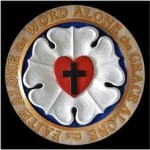FAQ
Jump to a Question
What does it mean to be a Christian?
What do I need to believe about Jesus in order to have faith?
How do I know if I am saved?
Are Christians judgmental?
Why should I listen to the Bible?
What is a church?
What is a Lutheran?
What does it mean to be a Christian?
A Christian is simply someone who believes in Jesus Christ. “Christ” was a title given to Jesus that means “Anointed One,” or “Chosen One.” From the moment sin entered the world, God promised mankind that He would send a Savior to pay for the sins of the world (Genesis 3:15); that Savior was to be called the “Christ” because He would be chosen by God to save mankind. In the Old Testament, this person was called the “Messiah” which means the same thing as Christ (John 1:41).
 Followers of Jesus Christ were first called Christians in the ancient city of Antioch (Acts 11:26). So often today people think that it’s what we do that makes us Christians. This notion is incorrect. People are only Christians because of what Jesus has done for them. Jesus suffered, died, and rose again to pay for the sins of the world (John 3:16). Those who believe in Jesus are given the blessings that He earned on the cross (forgiveness of sins, righteousness, eternal life, and more). Christ’s call from a life of sin to a life of faith is what makes someone a Christian (1 Peter 2:9).
Followers of Jesus Christ were first called Christians in the ancient city of Antioch (Acts 11:26). So often today people think that it’s what we do that makes us Christians. This notion is incorrect. People are only Christians because of what Jesus has done for them. Jesus suffered, died, and rose again to pay for the sins of the world (John 3:16). Those who believe in Jesus are given the blessings that He earned on the cross (forgiveness of sins, righteousness, eternal life, and more). Christ’s call from a life of sin to a life of faith is what makes someone a Christian (1 Peter 2:9).
What do I need to believe about Jesus in order to have faith?
To believe in Jesus means that you trust in Him for salvation instead of yourself or any other god. You may ask, why do I need salvation? I can be a pretty good person on my own. Well, we tend to think that but we still make many mistakes and there is no doubt that we can’t control much of what happens in our lives. Every person, no matter what he or she believes, thinks and wonders about what will happen after death. Jesus answers that for us and it comes through the salvation that He won (1 Corinthians 15:55-57).
The Bible doesn’t list a strict set of teachings that one must believe about Jesus in order to be assured of salvation, as if some teachings are important and others are not. God simply invites us to believe (John 20:31, Acts 16:31). But from what the Bible tells us about Jesus, we can clearly see what we are to believe about Him:
 -Jesus is the only way to salvation (John 14:6, Acts 4:11-12).
-Jesus is the only way to salvation (John 14:6, Acts 4:11-12).
-Jesus’ death has paid for the sins of the world (John 3:16, 1 John 2:1-2, Galatians 3:13).
-Those who believe in Jesus are forgiven and saved (Mark 16:16, Ephesians 1:7).
-Those who reject Jesus are dependent upon themselves for salvation, which no one can gain because all are sinful (John 3:17-18, 1 John 1:8-9, Romans 3:28).
-People believe in Jesus by faith (Habakkuk 2:4, Ephesians 2:8-9, Romans 5:1).
-Faith comes from the Bible – God’s Word (Romans 10:17, 2 Timothy 3:15, John 5:24, John 8:31-32).
How do I know if I am saved?
God clearly tells us in His Word that He has paid for the sins of the entire world (John 1:29, John 3:16, 2 Corinthians 5:19). Therefore, if you live in the world then Jesus has paid for your sins. There is no more that needs to be done, nor is there anything that you need to contribute. Jesus has done it all already because He loves you. Isn’t that good news? It is indeed, and that’s why the message of Jesus’ death and resurrection is called the gospel, which means “good news” (Romans 1:16).
But God doesn’t just demand that our sins be paid for, He also wants us to be perfect in thought, word, and action (Leviticus 19:2, Mark 12:30). We obviously are not righteous on our own and cannot become righteous on our own (Romans 7:18). Therefore, just as we need Jesus to pay for our sins, so also we need Him to grant us His righteousness. Again this comes to us by faith, which is why all who are saved must believe in Jesus (Mark 16:16, Ephesians 2:8-9). In the end it is quite simple. If you believe in Jesus as your Savior, you are saved, there is nothing else needed (Romans 10:9, Romans 3:23-24, Romans 6:23).
Are Christians judgmental?
There is a growing sentiment in America that Christians, particularly Bible-believing Christians, are judgmental of others. Others with similar feelings call Christians: hypocrites, bigots, hateful of others, and proud. Because of these sentiments, many who are unfamiliar with Christianity are automatically turned off by it. It is certainly true that Christians are sinners and make mistakes just like everyone else. Joining a church is not going to make someone perfect, only Jesus can do that. But it’s sad that so many immediately reject Jesus simply because of mistakes made by His followers. The foundation of Christianity is Jesus alone, not anyone who is called a Christian (1 Corinthians 3:11, Ephesians 2:19-20). And Jesus alone should be the focal point of Christianity and anyone who is interested in learning more about Christianity.
But God does call Christians to be His representatives on earth and to spread the gospel to others (2 Corinthians 5:19-20, Matthew 28:19-20). Because Christians bring a message of repenting from sin and believing in Jesus, some feel that they are being judgmental. It should not be the intention of Christians to look down upon others and judge them. Christians simply desire to share the message of free salvation to others, a message that comes through the Bible and teaches us to rely on Jesus, not ourselves. In fact, one of the first messages that Jesus preached was to repent  of sin and believe (Matthew 4:17). God alone is the judge of all people, not Christians (Psalm 82:8, Romans 2:16). The gospel is a message of love and should be spread out of love for one another. Yet God does not want us to ignore sin or to follow false gods or false beliefs, He wants us to speak the truth to others. The goal of a Christian should be to speak about the love of Christ with the truth of God’s Word, all done out of love for the individual (Ephesians 4:15, John 17:17). Sometimes this is difficult for sinful Christians to do and many times mistakes are made. But it would be an even bigger mistake to change God’s Word to fit the desires of society or of the world. God still calls us to speak the truth in love, even if it is difficult to do. And in the end, God tells us that following His Word islove (1 John 5:2-3).
of sin and believe (Matthew 4:17). God alone is the judge of all people, not Christians (Psalm 82:8, Romans 2:16). The gospel is a message of love and should be spread out of love for one another. Yet God does not want us to ignore sin or to follow false gods or false beliefs, He wants us to speak the truth to others. The goal of a Christian should be to speak about the love of Christ with the truth of God’s Word, all done out of love for the individual (Ephesians 4:15, John 17:17). Sometimes this is difficult for sinful Christians to do and many times mistakes are made. But it would be an even bigger mistake to change God’s Word to fit the desires of society or of the world. God still calls us to speak the truth in love, even if it is difficult to do. And in the end, God tells us that following His Word islove (1 John 5:2-3).
Why should I listen to the Bible?
The short answer is that the Bible is the only source of salvation that doesn’t require your help.
It’s clear that all people are sinful and make mistakes. It’s also clear that we all have questions and  concerns about what happens after we die. Do we really want to rely on ourselves for answers to the biggest questions in life? Do we really want to trust in our own power for life after death when we have such a hard time with day-to-day activities in this life? Throughout the history of the world people have tried in vain to answer the important questions in life and to shed light on what happens after death. On top of this, there are so many things in life that we know nothing about and can’t explain. Science and technology are blessings but they have limitations.
concerns about what happens after we die. Do we really want to rely on ourselves for answers to the biggest questions in life? Do we really want to trust in our own power for life after death when we have such a hard time with day-to-day activities in this life? Throughout the history of the world people have tried in vain to answer the important questions in life and to shed light on what happens after death. On top of this, there are so many things in life that we know nothing about and can’t explain. Science and technology are blessings but they have limitations.
The Bible is the only source that tells us that God has taken care of all of our needs already and that He holds the key to the greatest questions we face. If you look at any other religion in the world outside of Christianity, you will always find some element in them that requires man to do something. Christianity that comes from the Bible requires nothing of man, instead, Jesus Christ has already completed everything that is necessary for salvation. This is why we listen to the Bible, because it tells us of blessings that are given for free and gives us answers directly from God (Proverbs 30:5). Only the Bible tell us that Jesus, the Way, the Truth, and the Life (John 14:6), is our Savior. Christians take comfort and hope in the Bible because it means we don’t have to rely on our mistake-ridden lives to answer questions and receive life after death (John 10:10, Ephesians 2:8-9, 2 Timothy 3:15-17).
What is a church?
A church is a group of people who gather around the Word of God to study it and learn from it.  Most of us probably imagine some type of building or structure when we think of a church. But a structure doesn’t make a church, rather it’s the Word of God present among people that makes a church (Matthew 18:20, Colossians 3:16). When groups of people gather together to worship we call it a visible church, even if there is no ‘church type’ building present (Acts 14:23). It’s only the presence of believers and the gospel that makes an assembly of people a church (Ephesians 2:19-22). A group of people may call themselves a church but if they don’t believe in Jesus, or use His Word, then they are really only a church in name, not essence.
Most of us probably imagine some type of building or structure when we think of a church. But a structure doesn’t make a church, rather it’s the Word of God present among people that makes a church (Matthew 18:20, Colossians 3:16). When groups of people gather together to worship we call it a visible church, even if there is no ‘church type’ building present (Acts 14:23). It’s only the presence of believers and the gospel that makes an assembly of people a church (Ephesians 2:19-22). A group of people may call themselves a church but if they don’t believe in Jesus, or use His Word, then they are really only a church in name, not essence.
What is a Lutheran?
Within the broad category of Christian churches there are three main categories: Roman Catholic, Reformed, and Lutheran. By definition a Lutheran is someone who follows the same teachings as Martin Luther, a German who helped lead the Reformation some 500 years ago. Although both Reformed and Lutherans trace their beginnings back to the Reformation and are both classified as Protestants, they also differ in many ways. However, today there are also many different types of Lutherans which makes it difficult to fully understand what a Lutheran is.
Reformed, and Lutheran. By definition a Lutheran is someone who follows the same teachings as Martin Luther, a German who helped lead the Reformation some 500 years ago. Although both Reformed and Lutherans trace their beginnings back to the Reformation and are both classified as Protestants, they also differ in many ways. However, today there are also many different types of Lutherans which makes it difficult to fully understand what a Lutheran is.
By God’s guidance, Martin Luther led people back to the Bible as the source of truth. The Roman Catholic Church had become corrupted in many ways and throughout the years began to incorporate many teachings that are contrary to the Bible. The Holy Spirit led Martin Luther to see this and return to the Bible for answers. Through this, Luther rediscovered the precious teaching of justification by faith through Christ as found in the gospel (Romans 1:16-17, Romans 3:28). Luther  saw that justification was the center of the Bible and could only come from Christ, not our own works (Romans 3:23-24). This led to the formulation of the Lutheran church and the three pillars of the Lutheran church – Grace Alone, Faith Alone, Scripture Alone. As Lutherans we place our hope for spiritual renewal in the death and resurrection of Christ, as found in the Word of God. We do not rely on our own works to gain salvation; instead, we trust in Jesus by faith (Ephesians 2:8-9). This is true Lutheran theology.
saw that justification was the center of the Bible and could only come from Christ, not our own works (Romans 3:23-24). This led to the formulation of the Lutheran church and the three pillars of the Lutheran church – Grace Alone, Faith Alone, Scripture Alone. As Lutherans we place our hope for spiritual renewal in the death and resurrection of Christ, as found in the Word of God. We do not rely on our own works to gain salvation; instead, we trust in Jesus by faith (Ephesians 2:8-9). This is true Lutheran theology.
Lutherans of differing beliefs form groups of churches called synods. The word synod comes from Greek and means “same road.” Synods exist so that churches and members may know which other churches believe and practice the same things that they do. This unity of visible churches is called Church Fellowship and God expects us to have fellowship with those who teach the Word of God correctly (Romans 16:17, 1 Corinthians 1:10, Amos 3:3, 2 Timothy 1:13-14). Fellowship activities include prayer, worship, Communion, and Baptism. God wants us to have unity within our fellowship because there are many false teachers out in the world, those who teach contrary to God’s Word (1 John 4:1, Matthew 7:15, 1 Timothy 4:1, 2 Timothy 4:2-4).